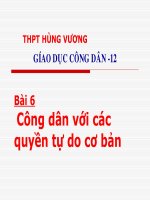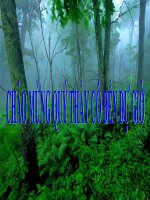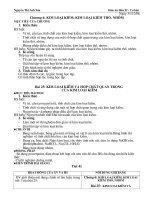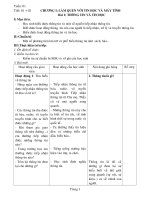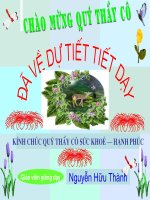bai 6 tiet 1, 2
Bạn đang xem bản rút gọn của tài liệu. Xem và tải ngay bản đầy đủ của tài liệu tại đây (39.85 KB, 3 trang )
Week 20
Date of making: 30/ 01/ 2009
Date of teaching: 04/ 01/ 2010
Lesson 1: Getting started - Listen and read + Listen
I/ Objective:
By the end of the lesson, students will be able to know about the environment and
somethings make the environment polluted.
- Giáo dục học sinh ý thức bảo vệ môi trờng
II/ Teaching aids:
Tape, cassette, pictures
III/ Procedure:
1. Warm up:
Teacher Students Content
* Brainstorm
? What makes our environment
polluted?
- Hang the pictures
- Ask Ss to look at the picture
and match with its name
- Call some Ss answer
- Check and give the key
- answer
- look at
- match
- answer
I/ Getting started:
a, air pollution ô nhiễm không khí
b, spraying pesticides phun thuốc
trừ sâu
c, garbage dump bãi đổ rác
d, water pollution
e, deforestation sự phá rừng
f, dynamite chất nổ
2. Presentation:
Teacher Students Content
- Ask Ss to answer some
questions
? What are you doing to our
environment?
? What should you do to protect
our environment?
* Introduce the lesson
Mr Brown and some volunteer
conservationists are going to
clean the beach. What is each of
them going to do? What does Mr
Brown want to happen to the
beach?
- Explain some new words
- answer
- listen to
introduce
II/ Listen and read:
- should save water
- clearn the school yard
- should plant trees,
flowers
- shouldn't damage trees
- shouldn't throw trash
1. New words:
provide (v) cung cấp
rock (n) đá
spoil (n) làm hỏng
disappointed (adj) thất vọng
3. Practice:
Teacher Students Content
- Ask Ss to listen to the
lesson and then do exercise
matching
- Call some Ss answer
- Check and give the key
* Ask Ss to read the lesson
again and answer the
questions
- Call some Ss answer
- Check and give the key
* Make question
? What will they achieve if
they work hard today?
- Explain the conditional
sentences: type 1
- listen and do
- answer
- read again
- answer
- copy
+ If they work
hard today, they
will make the
beach clean
Key a
1. Group 1
2. Group 2
3. Group 3
4. Mr Jones
5. Mrs Smith
6. Mr Brown
+ f
+ e
+ b
+ a
+ c
+ d
Key b
1. The speaker is Mr Brown.
2. The listeners are the volunteer
conversationists.
3. They are on the beach.
4. They are going to clean the beach
5. If they work hard today, they 'll
make the beach clean and beautiful
again soon.
6. - collect all the bags, trash
- sweep up school yard
- plant trees
7. - Our world becomes a harmful
place to live.
- We'll catch many serious diseases.
- Our life will be polluted.
2. Grammar:
If clause
- is/ am / are
- V(s/es)
Main clause
- will + V
- Mv + V
4. Pre - listening:
Teacher Students Content
- Ask Ss to
discuss in group
what make our
oceans polluted?
- Hang the poster
T or F
- Ask Ss to look
at the poster and
do
- discuss
- read the poster
and do
1 - T
2 - F
3 - F
4 - T
5 - F
* - oil and waste materials
- garbage
- raw sewage níc th¶i
- oil spill Sù dß dÇu, sù ®æ dÇu
True or False
1. People pump raw sewage directly in to the
sea.
2. Every year, ships drop about 16 million tons
of garbage into the sea.
3. Oil spills from ships don't kill marine life.
4. Factories let waste materials run into the
river.
5. Oil which is washed from the land doesn't
pollute the ocean.
5. While - listening:
Teacher Students Content
- Open the tape
- Ask Ss to check the key
- Ask Ss to listen again and
share with their partner
- Call Ss answer to
complete the table
- Check and give the key
- listen
- listen again
- answer
- copy
Key
Secondly: garbage is
Thirdly: come from ships at sea.
Next: waste materials come from
factories
Finally: oil is washed from the land
* Listen
Our oceans are becoming extremely polluted. Most of this pollution comes from
the land, which means it comes from people. Firstly, there is raw sewage, which is
pumped directly into the sea. Many countries, both developed and developing, are guilty
of doing this. Secondly, ships drop about 6 million tons of garbage into the sea each
year. Thirdly, there are oil spills from ships. A ship has an accident and oil leaks from the
vessel. This not only pollutes the water, but it also kills marine life. Next there are waste
materials from factories. Without proper regulations, factory owners let the waste run
directly into the rivers, which then leads to the sea. And finally, oil is washed from the
land. This can be the result of carelessness or a deliberate dumping of waste.
6. Homework:
- Do exercise a, b into exercise book
- Read the lesson again
- Prepare " speak"
PhÇn bæ sung
Date of making: 03/ 01/ 2010
Date of teaching: 9/ 01/ 2010
Lesson 2: Speak
I/ Objective:
By the end of the lesson, students will be able to know about the environment and
somethings make the environment polluted.
- Giáo dục học sinh ý thức bảo vệ môi trờng
II/ Teaching aids:
Textbook
III/ Procedure:
1. Warm up:
Teacher Students Content
* What is it?
- Ask Ss to find the
answer for each
question in column
A
- answer
1 - c
2 - a
3 - b
4 - d
5 - e
A
1. Crops are sprayed with it
2. You can put your rubbish in it
3. We can't breathe without it
4. It's a powerful explosive
5. We must put it in a rubbish bin
B
a, garbage
dump
b, air
c, pesticide
d, dynamite
e, trash
2. Pre - speaking:
Teacher Students Content
* Brainstorm: What should
(not) we do to protect the
environment?
* Explain some new words
Exhaust fume khói từ các
động cơ
- speak * Should: + keep water clean
+ plant more trees
+ collect trash
+ recycle cans, bottle
* Shouldn't
+ throw trash in the sea
3. While - speaking:
Teacher Students Content
- Ask Ss to read example
- Ask Ss to make new
dialogue
- Call some Ss answer
* Ask Ss to look at
Questionare
? What is the questionare
about?
- Ask Ss to answer the
questions in group
- Ask ss to hang the poster
- Check and repair
- read example
- pair work
S1: I think we should
go to school on foot.
S2: Why?
S1: We can avoid
traffic jams.
- it's about protecting
the environment.
- group work
* Suggested idea
- Save paper? Write on both
sides of the paper recycle used
paper.
- Use fewer plastice bag: save
plastic bags, clean and reuse
them, use cloth bags not
buying products which are
overpackaged, use tree leaves
to wrap food.
- Reduce water pollution?
Don't throw waste and garbage
into lakes don't kill fish.
4. Post - speaking:
Teacher Students Content
- Ask Ss to practice in pairs
to speak the best protecting
environment
- Call some Ss do
- Check and repair
- read example
- pair work
Example
S1: I think we should do St to protect
the environment.
S2: How can we do that?
S1: We can use fewer plastic bags. We
should use tree leaves to wrap food.
S2: What about using cloth bag?
S1: That's a good idea.
5. Homework:
- Write a paragraph to persuade your friend what you should do to protect the
environment.
- Do exercise 2 workbook
- Prepare " language 1,3"

